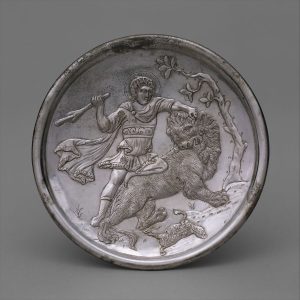Archive, Readings
Desert Fathers 23
You can find this episode in video format here – a dedicated page – and pick it up in audio wherever you listen to podcasts. On YouTube, the full range of episodes can be found here.
Another brother put a question to Abba Poemen, saying: ‘What can I do, for I am embattled by lust and carried away by anger?’ The elder said to him: ‘On account of this David said, “I smote the lion, I strangled the bear”, which is to say, I cut off anger and by labours I squeezed the life out of lust.’ He further said: ‘You cannot live according to God if you are a lover of pleasure and a lover of money.’
Catholics are supposed to be obsessed with questions of sex, locked, when it comes to this most intimate dimension of human existence, in intractable complexes. This assumption is voiced whenever representatives of the Church take their courage into both hands and make some statement on sexual morality. The secular establishment takes it for granted that we have nothing of value to say on this topic. It considers us compromised, first, by constitutional bigotry, then by ignorance, as if Catholics were somehow beyond biology. Scandals of abuse, an open wound on the Church’s body, have compromised our credibility further; what is more, they have made us reticent to speak, conscious of the risk involved in throwing stones when living in proverbial glass houses.
But must Christian discourse on sex involve throwing stones?
No! On this point we must insist. Christian moral doctrine is primarily concerned with thriving, dignity, and the just pursuit of freedom in Christ. This holds for our teaching on sexuality, too. Often we have failed to make this connection sufficiently clear. If people misconstrue our message, it may be because so much ink, and breath, has been spent expounding sexual mores at the expense of other vital aspects of virtue — and vice. I think of something Dorothy L. Sayers, that intrepid expositor of things-as-they-are, spoke on 23 October 1941 to the Public Morality Council at Caxton Hall, Westminster in an address called The Other Six Deadly Sins:
Perhaps the bitterest commentary on the way in which Christian doctrine has been taught in the last few centuries is the fact that to the majority of people the word ‘immorality’ has come to mean one thing and one thing only. The name of an association like yours is generally held to imply that you are concerned to correct only one sin out of those seven which the Church recognises as capital. […] I am reminded of a young man who once said to me with perfect simplicity: ‘I did not know there were seven deadly sins: please tell me the names of the other six.’
Our teaching on sex must be situated within a wider account of what it means to live a Christian life. The Desert Fathers offer us precious assistance in this regard.
Let us begin by clarifying some terms. The Fathers had few hang-ups about sex as such. They were not Manichees. Faced with dualists trends, they condemned them, the way Paphnutius, a follower of Antony’s, did at Nicaea, when he affirmed that a married man’s intercourse with his wife deserves the name of chastity. Nor were the Fathers inimical to eros. Theirs was an existence grounded in desire. They were concerned to channel, not to cancel, the body’s yearning. Like Job they hoped to see God in their flesh. The impulse against which they launched battle was that of lust.
Their Greek word for it was porneia. It has often been rendered ‘fornication’, but that is not an optimal option; fornication, after all, suggests an act involving two people, whereas porneia can perfectly well work its ravages in an isolated person’s affectivity and mind. In ancient Greek, porneia was a term for prostitution. The association is telling. It speaks of intimacy procured by way of a transactions in view of self-satisfaction, with little or no concern for mutuality. Eros presupposes yearning for another. Lust is merely concerned with fulfilment of want or felt need.
Our cultural climate inclines to idealise lust. We like to imagine lust as a playful expression of our true, innocent self, a path to freedom. The Fathers would have shaken their heads in disbelief. And indeed, when we look at the West over the past half-century and a bit, has ‘sexual liberation’ in fact made us free in this regard?
To the Fathers, lust stood for the opposite of freedom. Lust confers not vision but blindness. It locks me in myself, making me live in the world as if I were its sole significant subject, subsisting on arousal. Lust is easily the death of love. It envisages no encounter; it wants to get laid. There is something vampiric about lust. Contrary to appearances, it may not even be about carnal hunger primarily. It may be a round-about way of drawing into consciousness some ravenous soul-passion like rage or greed: a frustrated, potentially perverse means of self-affirmation. Poemen says that attempts to temper lust are unlikely to work unless, at the same time, I deal with my hidden reserves of anger — a sharp observation that could provide a hermeneutic key with which to interpret patterns of sexual abuse and manipulation we now recognise in many societal structures. This, though, would require us to relinquish our dearly-held mythology of the innocence of sex. That threshold remains high. Perhaps it cannot be crossed in an era that has abandoned, or forgotten, God, for which sex represents most people’s only intimation of transcendence? For without some such notion, be it an implausible pleasure myth, not even secular man can live.

Byzantine medallion of David slaying the lion, now in the Met Museum.
